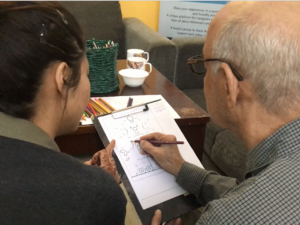 Dementia is a group of neurological and progressive symptoms which is generally seen in older people. The symptoms worsen over time and gradually the person’s capacity to take care of himself or herself on their own starts to decrease. A risk factor can be anything that increases the likelihood of developing a particular condition.
Dementia is a group of neurological and progressive symptoms which is generally seen in older people. The symptoms worsen over time and gradually the person’s capacity to take care of himself or herself on their own starts to decrease. A risk factor can be anything that increases the likelihood of developing a particular condition.
Dementia also has many risk factors which include:-
- Age: – Age is one of the major factors in developing Dementia. The chances of getting Dementia increases when one gets older i.e. 65 and above. Various physical and mental changes occur in our body with age, which becomes one of the causes of developing Dementia. Nearly one-third of the population above 85 develop Dementia.
- Genetics: – Genes may or may not effect directly in causing Dementia but they do have an indirect link towards the disease. For example, a gene named as Apolipoprotein E is linked with the cause of Alzheimer’s disease. Also if a person has a first degree relative who has Dementia, then he or she has an increased chance of developing the disease than a person who has no family history of the same. In addition, certain mutations in specific genes have been identified as increasing the risk for developing dementia.
- Medical conditions: – Medical conditions like Stroke, Cardiovascular problems, Obesity and Head Trauma, especially in mid-life can be one of the major factors in developing Dementia. Cardiovascular conditions are mostly linked to Vascular Dementia. Basically, the conditions that cause damage to the heart, arteries or blood circulation are strongly related to developing the vascular type of Dementia.
- Psychological and Neurological conditions: – Conditions like Depression and Parkinson’s disease increase the chance of developing Dementia. These can be a symptom as well as the cause of the disease. Other rarer causes are Down syndrome, Learning Disabilities and Multiple Sclerosis.
- Mild Cognitive Impairment: – It is the stage in between the cognitive decline because of ageing and more severe decline that leads to Dementia. It is not necessary that MCI will end up in Dementia, but a person who has MCI has a greater risk of developing Dementia. Most cases of Alzheimer’s disease start with MCI.
- Lifestyle choices: – Lifestyle choices like smoking, drinking alcohol, physical inactivity etc. have been linked to developing Dementia. If a person smokes, he will have a higher risk of atherosclerosis and other types of vascular disease. Drinking large amounts of alcohol also increases the risk of developing a type of dementia known as Wernicke-Korsakoff syndrome. Risk for Dementia is lower in people who maintain a healthy lifestyle in their middle ages.
Some risk factors that lead to Dementia can be prevented and are avoidable but some cannot be controlled like age and genetics. Some tips for prevention and avoidance for risk factors for Dementia are: –
- Physical activity: – Minimum amount of exercise, five days a week for 30 minutes each can prove wonders for a person. It can improve the cardiovascular health, improve mental and physical well-being and reduce the risk of developing Dementia. Exercise will also help in maintaining balance and gait which is one of the main features of Parkinsonism. Exercise without losing weight can bring many health benefits. Exercise doesn’t mean going to the gym and doing cardio or machines. It can be brisk walking, cycling, dancing, playing simple indoor games like catch or carom etc.
- Saying no to smoking and excessive drinking: – If a person smokes or drinks a huge amount, the chances of getting Dementia increases manifold. It is better to restrict smoking and drinking to prevent such issues. Even if a person stops smoking very late in life, he/she is still reducing the chances by a large margin.
- Eating healthy and maintaining a healthy weight: – Factors like Obesity, Cardiovascular diseases, High blood pressure, cholesterol, type 2 diabetes can be controlled by eating healthy and maintaining a healthy weight. A healthy balanced diet includes lots of fruits and vegetables. Not only Dementia, it can reduce a lot of symptoms of many physical and psychological illnesses and help in leading a life disease free.
- Keeping mentally and socially active: – One of the major reasons for an elderly to develop any kind of disorder is isolation and refraining from all the activities that they used to do. Keeping oneself active by engaging in various new things will stimulate the brain to work in brilliant new ways. For example, playing stimulating games like Chess, Sudoku or learning a new language will make the brain work. Regular mental activity throughout a person’s lifetime seems to increase the brain’s ability. This helps build up a ‘cognitive reserve’ and allows the brain to cope better even with a disease such as Dementia. Keeping mentally active can reduce the risk of Dementia by several years. This link between brain activity and dementia is sometimes described as ‘Use it or lose it’.
